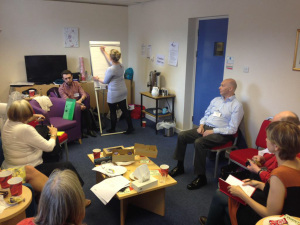Sadly, I have heard this said a lot over the years. Care givers who have become exasperated by individuals with dementia who just insist on getting up! Shocking, isn’t it, as we all sit unoccupied for hours at a time…
Imagine if you were assisted out of bed, given your breakfast, then sat in an armchair. You need to go to the bathroom, so you get up. You’re immediately told to sit back down. You see a book you’d like to look at, so you get up to retrieve it. You’re asked to sit back down. You’re thirsty, so get up to go to the kitchen. “Sit down, please”. You see a familiar face and want to go and tolk to them, so you get up. “Sit down!” You’re hungry, so get up to reach the biscuits. “Please,sit down!” By this point, I probably would have caused a bit of a scene!
I was asked to see a patient urgently today because he was being “aggressive”. It transpired that the practitioner had been attempting to catheterise the man who was in retention – yeah, I probably would have been on the hostile side if I didn’t understand what was going on!
Sigh.
If someone gets up from a chair, they have a purpose in mind. If that person has dementia, that purpose may not be recalled after a few moments, however we are active beings and encouraging mobility in older adults is so important for many areas of health and well-being. It should be encouraged! Yes, hospital wards are busy places. Yes, there is a risk of falling. But life is full of risks, isn’t it? A five minute walk along the corridor with someone in the longer term can save time, distress, minimise the risk of hostility and the need for sedation. Understanding that the person with dementia is getting up with a purpose and trying to gain insight into what that purpose is means that they will feel heard; they will feel visible, and that they are still communicating their needs. And this will pay dividends in the longer term.
X x






 This is the third item from my
This is the third item from my